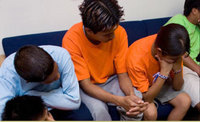Handling of immigrant children is criticized
November 20, 2008
More than 43,000 children from Mexico and other countries being repatriated at the U.S. border are not being cared for properly, according to a recently released report by the Center for Public Policy in Austin.
The report, titled "A Child Alone and Without Papers," states that the center found scant guidance on how those children should be repatriated to their home countries.
Written by Diana Washington Valdez , The El Paso Times

EL PASO -- More than 43,000 children from Mexico and other countries being repatriated at the U.S. border are not being cared for properly, according to a recently released report by the Center for Public Policy in Austin.
The report, titled "A Child Alone and Without Papers," states that the center found scant guidance on how those children should be repatriated to their home countries.
The report alleges the U.S. government is compromising the rights, safety and well-being of undocumented immigrant children, contrary to international law and U.S. child-welfare standards.
Statistics provided by the Mexican government show that 35,546 youths -- from infants through age 17 -- were returned to Mexico between January and September of this year. Of these, 6,105 were returned through Chihuahua state, including 3,213 unaccompanied youths from Mexico's interior states. The rest were from Juárez and other cities of the border state.
"The U.S. treats undocumented, unaccompanied children with a shocking lack of concern. Our domestic child-welfare system has shaped international standards on child treatment, but we have not extended our standards to this vulnerable population," said Amy Thompson, the report's author. "Policymakers should act swiftly and forcefully to prioritize the welfare of all children in U.S. custody."
Among the complaints mentioned by the report were: ignoring requests for medical attention, lack of water at Border Patrol stations, not receiving food or receiving insufficient amounts of food, being struck or knocked down by agents, and "being handcuffed and being transported 'like dogs' in kennel-like compartments."
Jason Ciliberti, a supervisory Border Patrol agent on assignment in Washington, D.C., said the Border Patrol follows guidelines for processing undocumented minors that were developed after the Flores v. Reno case settlement. Flores v. Reno stemmed from a 1985 class-action lawsuit against the former Immigration and Naturalization Service for the process used to arrest, detain and release minors. In 1993, the U.S. Supreme Court ruled in favor of the immigration agency on some points, and the rest of the litigation led to a settlement between the parties.
"Minors are segregated from adults, are processed out within 72 hours of detention and their consulate is notified of their status," Ciliberti said. "We have a policy and Border Patrol agents are trained on this. As for the trucks, I've seen consuls refer to them as 'perreras' (dog kennels), but they are actually capsules placed on the bed of a pickup truck that have seat belts and have cooling and heating. They are not dog kennels."
Thompson said the Flores v. Reno guidelines apply to only the detention of undocumented immigrants. "There really is nothing that provides procedures and policies for the repatriation process itself," she said.
Each month, Rosalba Torres, an official at the Mexican consulate in El Paso, interviews hundreds of minors detained by the Border Patrol and Immigration and Customs Enforcement officers.
"It's unfortunate these youths risk their lives by crossing the border in the manner in which they do," Torres said. "We had a 14-year-old girl from Juárez who told us she used drainage tunnels to cross into El Paso. This was very dangerous."
Most unaccompanied minors are seeking to be reunited with relatives or are hoping find jobs in the United States.
Roberto Rodriguez, the Mexican consul in El Paso, said the El Paso border region has a model program for processing minors that works well. For example, under an agreement with U.S. authorities, minors are not to be repatriated in the middle of the night.
"Because of that, we have not seen the more serious kinds of complaints mentioned in the (CPPP) report," he said. "Over the years, our capacity to deal with minors has improved and increased."
![]()
![]()
Related Stories
![]()
Fair Use Notice
This site contains copyrighted material the use of which has not always been specifically authorized by the copyright owner. We are making such material available in our efforts to advance understanding of environmental, political, human rights, economic, democracy, scientific, and social justice issues, etc. We believe this constitutes a "fair use" of any such copyrighted material as provided for in section 107 of the US Copyright Law. In accordance with Title 17 U.S.C. Section 107, the material on this site is distributed without profit to those who have expressed a prior interest in receiving the included information for research and educational purposes. For more information go to: http://www.law.cornell.edu/uscode/17/107.shtml. If you wish to use copyrighted material from this site for purposes of your own that go beyond "fair use", you must obtain permission from the copyright owner.